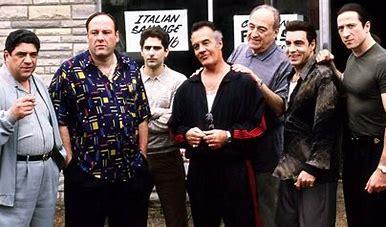The title of my blog is the title of a 1974 song by Peter Allen (real name: Richard Peter Woolnough, an Australian). There is an Italic connection: Allen was singer Liza Minelli’s first husband. But there’s an even bigger Italic connection: the title perfectly refers to a condition which only infects Italian Americans: Regular, cyclical, anti-Italian prejudice via Hollywood. And it’s aided and abetted by the media, both regular journalism and its pop culture outlets.
(And also, quite sadly, by millions of Italian Americans who willingly accept these degraded images with nary a fuss.)
People keep razzing enlightened Italian Americans about sounding like broken records. The truth is, we keep making the same points over and over again because such “records” are never truly broken. If they were, we would shut up overnight. Yet negative imagery of Italian Americans—ubiquitous and overwhelming—never goes out of fashion. The recent 25th anniversary of HBO’s The Sopranos proves how this old stuff remains brand spanking new.
We thought we were done with The Sopranos when it ended in 2007. And yet, thanks to the combined power of social media and a social epidemic (COVID), bored Gen Z kids across America rediscovered it. This provided more fuel for the regular media, already geared up for the 25th anniversary.

I happened to come across a March 30th, 2001 article in The Los Angeles Times addressing the subject of Italian American stereotypes. It was written by the paper’s cultural critic (since retired) Howard Rosenberg. And it was inspired by the success of The Sopranos, more specifically by how organizations like ours were going against the grain by throwing spitballs at it. (For those with short memories: Critics and pundits universally praised the program.)
I found the following section, posted below, to be very revealing. Please note our founder, John Mancini’s, sensible comment about why the show was (and still is) so pernicious. But pay even closer attention to how Mr. Rosenberg soon begins trotting out the familiar rationalizations and enabling arguments.
This is what Rosenberg wrote in 2001:
Some of these groups seem to believe that Americans are incapable of separating Giorgio Armani from Vito Corleone.
The Sopranos tells viewers that “average Italian Americans, even their children, are not really what they seem,” says John Mancini, chairman of the Italic Studies Institute. “It is the oldest form of propaganda that demonizes a minority using repeated visual images that linger long after in the minds of viewers.”
History teaches us that Mancini is correct about the cumulative power of propaganda. He is wrong, though, about Italian Americans being stigmatized as a group.
From Frank Capra and Leonardo DiCaprio to U.S. Supreme Court Justice Antonin Scalia, they are far too numerous and deeply ingrained in all aspects of U.S. life to be herded into one category. Even after all these movies and TV shows, the overwhelming bulk of Americans still don’t believe that the “I” crowd thrives primarily on crime. They may believe that all mobsters are Italian, but not that all Italians are mobsters.
Contrast that with the more dangerous stereotyping of other minorities, especially African Americans. Historically, for many reasons, most whites have not had the kinds of close relationships with African Americans that would override years of exposure to negative black stereotypes. This distance, geographical and emotional, has bred suspicion and ignorance.
But that is not the case with Italian Americans, whose integration into the wider U.S. culture is complete. Italians are nearly everywhere and everyone, your next-door neighbors as well as your companions at work. Americans celebrate nearly everything Italian, from opera to furniture to food. They flock to Italian restaurants and eat there beside other diners who they know are more likely to be spot welders than ruthless Tony Sopranos plotting “waste management.”
Speaking of dining, taking away their pasta would send Americans to rehab. Without trattorias and pizza, life would not be worth living. And Italy, by the way, has long been a favorite vacation spot for Americans traveling abroad. [End of Rosenberg’s opinion piece]
I’ll rebut Mr. Rosensberg’s tried-and-true comments one-by-one:
1) “Italian Americans are not stigmatized as a group”—Then why, in 2025, did the national press make fun of alleged killer Luigi Mangione’s “funny name” last month? Why did Michael Kosta, host of the Daily Show, ‘joke’ that “Mangione’s Italian, which doesn’t necessarily make him a criminal. Well, maybe.”
2) “Not all Italians are mobsters.”—Really? Why is that the first comment or joke people make when they find out you’re Italian American? And when has our media ever referred to Capra, Di Caprio, or Scalia as “Italian American”? Their ethnicity is never mentioned. But that of Italian crooks? You bet.
3) “Stereotyping of African Americans”—I wonder if Rosenberg has noticed that, since the ‘Oscar-So-White’ campaign directed at Hollywood in 2016, the end result has been the total eradication of gross Black stereotypes in movies and TV. Their true stories are finally being told…and celebrated.
4) “The integration of Italians in US culture is complete”—See above comment. Not in Hollywood. Our images remain disrespectful and false.
5) “Speaking of dining..”—The ultimate defense (and belief): The only worthy contribution which Italians made in America is food. Pass the Brioschi!
Howard Rosenberg is retired but still alive. He is now 86 years old. Does he realize that nothing has changed in the 24 years since he wrote that piece?
Everything old is new again. But, not to the Italic Institute of America. Public prejudice against Italian Americans remains odious to us. Oy vey! -BDC




Recent Comments